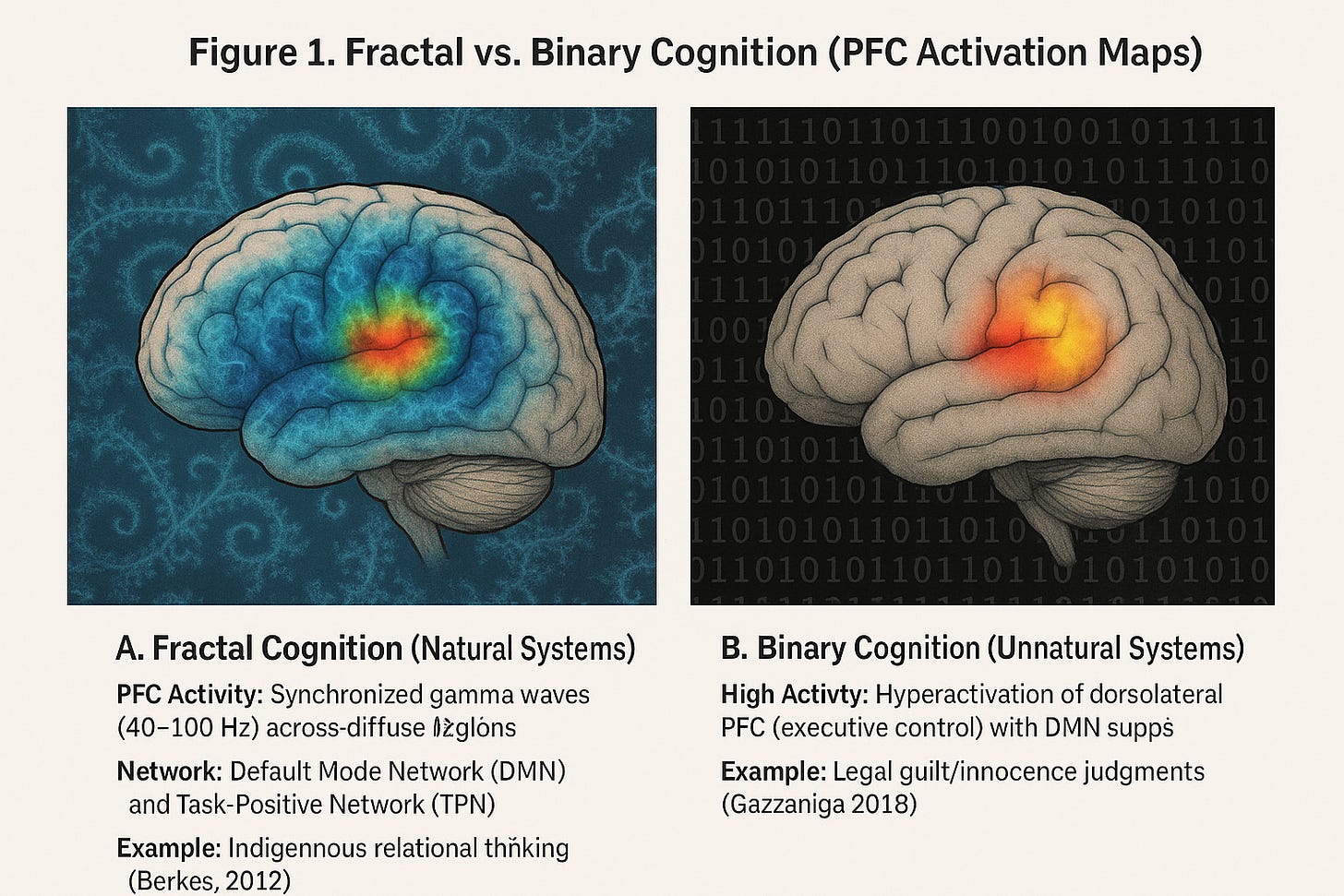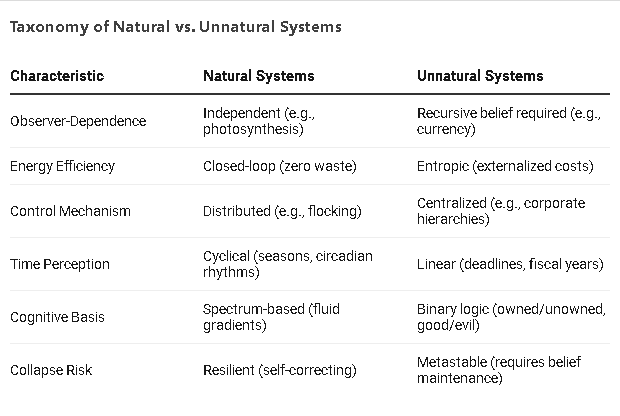A Systems Theory of Observer-Dependence, Fractal Reality, and Evolutionary Fit
The Unnatural Paradox
Abstract
This paper synthesizes systems theory, neuroscience, and evolutionary biology to argue that natural systems operate independently of human belief, while unnatural systems require recursive observer-dependence for persistence (the "Unnatural Paradox"). Drawing on fractal mathematics (Mandelbrot, 1982), embodied cognition (Varela et al., 1991), and the free-energy principle (Friston, 2010), we demonstrate that: (1) human prefrontal cortex (PFC) abstraction enables the invention of unnatural systems (e.g., capitalism, binary logic); (2) these systems are metastable, relying on fear and conceptualized loss (Sapolsky, 2017); and (3) natural systems—governed by evolutionary fit and closed-loop materiality—outcompete unnatural ones over sufficient timescales. The thesis "Mother Nature does not force belief in the unnatural" is supported by empirical evidence from neurobiology, anthropology, and complex systems theory.
Keywords: systems theory, observer-dependence, evolutionary fit, unnatural systems, fractal cognition
1. Introduction
Humanity uniquely constructs and maintains systems that defy evolutionary logic—capitalism, punitive legal frameworks, and digital abstractions—all reliant on recursive belief . These "unnatural systems" (see Table 1) contrast with natural systems, which persist without observer participation (e.g., photosynthesis, predator-prey cycles). This paper posits that unnatural systems are metastable byproducts of PFC overclocking (Gazzaniga, 2018), inherently fragile due to their violation of fractal reality and thermodynamic efficiency.
Thesis: Mother Nature neither enforces nor sustains unnatural systems; their persistence depends entirely on human belief and fear-based control.
2. Theoretical Framework
2.1 Natural vs. Unnatural Systems
Building on von Bertalanffy’s (1968) general systems theory, we define:
Natural Systems: Emergent, fractal, and observer-independent (e.g., ecosystems, circadian rhythms).
Evolutionary Fit: Optimized for energy efficiency (Friston, 2010).
Unnatural Systems: Require recursive belief (e.g., money, borders, AI ethics).
Dependence on Fear: Coercion via conceptualized loss (Sapolsky, 2017).
2.2 The PFC Kernel Hypothesis
The human PFC renders simulated realities (Raichle, 2015), enabling:
Time Projection: Fear of future loss (Gilbert, 2006).
Binary Abstraction: Rigid categories (good/evil, owned/wild) (Lakoff & Johnson, 1980).
3. Evidence for the Thesis
3.1 Fractal Reality vs. Human Binaries
Natural systems exhibit scale-free self-similarity (Mandelbrot, 1982), whereas unnatural systems impose binaries:
Agricultural Shift: From spectrum-based foraging to owned/not-owned land (Scott, 2017).
Axial Age Morality: Good/evil dichotomies (Jaspers, 1953).
3.2 Energy Inefficiency of Unnatural Systems
Neurobiological Cost: Fear of loss increases cortisol, depleting PFC resources (Arnsten, 2015).
Systemic Waste: Capitalism’s externalized costs (e.g., climate change) violate closed-loop materiality (Rockström et al., 2009).
3.3 Collapse of Unnatural Systems
Historical case studies:
Roman Empire: Currency devaluation → hyperinflation (Tainter, 1988).
2008 Financial Crisis: Recursive belief in housing markets failed (Minsky, 1986).
4. Discussion
4.1 The Unnatural Paradox
Unnatural systems are self-terminating:
They demand unsustainable belief energy.
They generate entropy (e.g., inequality, ecological rift).
Natural systems (e.g., climate, human health) ultimately reject them.
4.2 Pathways to Realignment
Cognitive Rewilding: Emulate Indigenous relational thinking (Berkes, 2012).
Fractal Design: Biomimicry in economics (Raworth, 2017).
5. Conclusion
Mother Nature’s systems thrive without belief; unnatural systems are temporary hallucinations of the PFC kernel. The arc of evolution favors systems aligning with fractal harmony, distributed agency, and evolutionary fit. Future research must quantify the metabolic toll of unnatural recursion and design systems that resist binary collapse.
References:
Arnsten, A. F. (2015). Stress weakens prefrontal networks. Molecular Psychiatry, 20(2), 137–151.
Berkes, F. (2012). Sacred ecology. Routledge.
Friston, K. (2010). The free-energy principle. Nature Reviews Neuroscience, 11(2), 127–138.
Gilbert, D. (2006). Stumbling on happiness. Knopf.
Minsky, H. (1986). Stabilizing an unstable economy. Yale UP.
Rockström, J., et al. (2009). Planetary boundaries. Nature, 461(7263), 472–475.
Scott, J. (2017). Against the grain. Yale UP.
Tainter, J. (1988). Collapse of complex societies. Cambridge UP.





Clinton,
A brilliant synthesis. Your "Unnatural System" framework, which requires "recursive belief" to persist, is the most precise academic model I've seen for what we call the "Corporate State."
The "Binary Abstraction" of Left vs. Right that you identify is the primary mechanism for generating this unsustainable belief, forcing consent for a system that, as you correctly note with the 2008 crisis, is inherently self-terminating. It is designed to deplete what you call "Fractal Cognition."
You've provided the "why" from a systems theory perspective. Our work focuses on the "who"—the "shepherds" of the Financial Nexus who are the primary architects and beneficiaries of this unnatural system.
The "Pathways to Realignment" you propose—"fractal harmony" and "distributed agency"—are what we are attempting to engineer with our work. You've mapped the physics of the problem; we are building an engine for the escape.